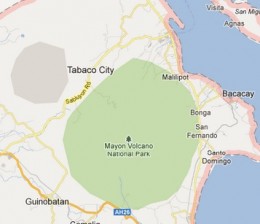Albay health execs confirm meningo case; 22 persons monitored

Dr. Luis Mendoza, chief of the Provincial Health Office, said Friday that their contact-tracing efforts established that at least 11 persons in Tabaco City and 11 more in Daraga, also in Albay, had come in contact with the patient.
He said the health office’s surveillance team immediately gave the 22 people chemoprophylaxis, a drug to prevent the disease.
Mendoza confirmed the victim was “clinically afflicted” with meningococcemia based on her symptoms, which included fever and rashes.
He said after her death, she was placed in a body bag and in a sealed casket and buried immediately on the same day in the public cemetery in Tabaco City. The burial was closely supervised by the city sanitary inspector and other health officials, he said.
Immediate burial was necessary to prevent the spread of the disease, meningococcemia being a highly contagious disease that can be transmitted through respiratory droplets.
Article continues after this advertisementMendoza said the girl’s father arrived from Masbate, her home province, on the day she died but he was prevented from seeing her body prior to her burial to prevent contamination.
Article continues after this advertisementMendoza said the victim was a native of Aroroy, a mining town in Masbate, but was staying at a boarding house in Barangay Matagbak in Tabaco City as she was studying at the Bicol University there.
Before the June 13 opening of classes, the girl stayed with her aunt for a week, or from June 4 to 11, in Barangay Villahermosa, Daraga, and went to Tabaco City on June 11 and stayed at her boarding house.
Dr. Nathaniel Rempillo, assistant provincial health chief, said they have yet to determine where the girl contracted the disease.
He added that the 22 persons found to have come in contact with the victim were told to be on self-observation for a period of one week and to immediately alert health authorities should they manifest body pains and rashes.
He stressed that there was no need to quarantine the 22 persons as the drug given to them was a “100 percent guarantee” that they would not get the disease.
Rempillo said that so far, the 22 have not shown any symptoms of the disease but they were advised to refrain from going around their respective communities or in any public place while they are under self-observation.
The Department of Health has described meningococcemia as an acute and potentially life-threatening infection of the bloodstream caused by bacteria called Neisseria meningitidis.
The bacteria frequently live in a person’s upper respiratory tract without causing visible signs of illness. The bacteria can be spread from person to person through respiratory droplets or air borne.
Family members and those closely exposed to someone with the condition are at increased risk.
Symptoms may include fever, rashes, headache, anxiety, irritability, muscle pain, and nausea. Later symptoms may include changing levels of consciousness and large areas of bleeding under the skin.